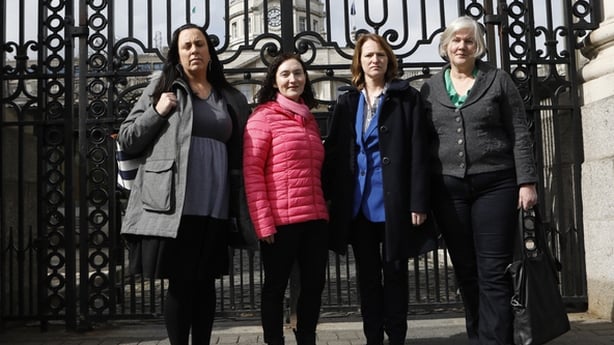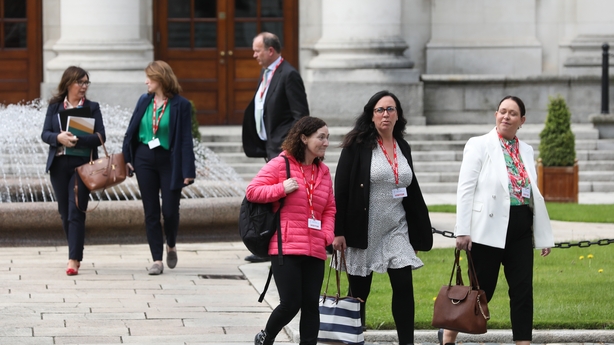Tánaiste Micheál Martin has indicated that he plans to recommend a public Tribunal of Inquiry to investigate allegations in the Defence Forces highlighted by the Women of Honour group.
The group had said a public inquiry was essential to restore trust rather than a behind closed doors investigation.
The Women of Honour group has highlighted allegations of emotional abuse, physical torture, bullying and sexual misconduct in the Defence Forces.
The Government has committed to a statutory inquiry after an independent review found serious failings in the internal complaints system.
But it was not clear whether that investigation would happen in public or private.
Tánaiste and Minister for Defence Micheál Martin told the Dáil today that he is minded to recommend a tribunal with mechanisms to protect witnesses who may not wish to be identified.
He also wants the inquiry set up before the Dáil rises next week.

Labour leader Ivana Bacik had urged the Government to take on board the concerns of the Women of Honour and set up a tribunal based on their terms of reference.
Earlier, the group said it was disappointed that the Government was going ahead with what it called a "flawed" inquiry into the allegations.
It said it believed the proposed terms of reference were far too narrow and would not address many of the issues that members had raised.
The Women of Honour are meeting Mr Martin today.
Retired army captain and Women of Honour member Diane Byrne said from the information the group had received appeared to show no real change to the terms of reference put forward and that was of "grave concern".
Speaking on RTÉ's Morning Ireland, she said there are two key aspects; the type of inquiry that goes forward - that it "absolutely has to be a tribunal with public accountability - and full transparency.
"Then the terms of reference need to be sufficient enough to encompass as many of the issues that we have highlighted so far," she added.
"But what seems to be coming forward is that it's looking at the kickoff incident, such as a discrimination or a sexual assault, and not a single-minded across-the-board mistreatment that victims have been subjected to in order to eliminate them as a problem."
Ms Byrne said that the Tánaiste is "still calling it a statutory inquiry" but there are differing opinions on the options for an investigation.
"There are two different options on the table at this point, one is a commission of inquiry and one is a tribunal of inquiry and the key difference to that is a tribunal will be held in public and a commission will be held in private.
"The key issue for all of the victims at this point is that everything that has happened and everything that they have been subjected to date has happened behind closed doors.
"There is no trust."
She said from what has been said by Mr Martin, it implied that a commission of inquiry had been decided upon, "because the discretion is with the judge".
"We're looking for the discretion to be part of a tribunal, where less discretion lies with the decision makers and there is more public accountability. It will be held in public. It will provide victims with more clear opportunities to understand what's going on in terms of having their legal representative automatically entitled to be there.
"Whereas with the commission, that stuff is down to discretion. Discretion, there's no place in this at this point for too much discretion … People don't have faith in a system at this point that has been based in secrecy and concealment.
"There is no trust and there is a lot of damage done and to get the faith of the people that are involved you need to assure them of the public nature now rather than say there's a discretionary aspect to it."

On protecting people's right to privacy, she said tribunals have a basis to protect anonymity.
"The opposite to that is that you remove people's right to waive that anonymity, which is what huge numbers of people are looking for. And that's the protection that people want.
"If people who choose to waive their anonymity can, there is a public protection there because they can be named and any damage that happens to them or their careers after that point can be linked. There can be a correlation back. We've seen that ourselves, whereas if it's behind closed doors to protect small aspects of anonymity that can be still protected through a tribunal, then you are taking the rights of so many others away."
Ms Byrne said that it is going to be "very, very difficult" for the inquiry to be completed in two years, as has been imposed.
"One of the key issues is, we have to do a full review. It has to be a really, really detailed investigation or you're not going to get the answers that may take longer than two years. There are huge, huge numbers of victims there."
She added that there are garda inquiries mixed in with the Women of Honour group and has asked that garda aspects up to this point be incorporated in a tribunal "for the simple fact that there are large numbers of people who have gone to the gardaí up to this point and we need to understand what has happened in those incidents.
"There have been indications that people didn't automatically go to the guards, but we also have reports of people who did, and they are just more questions that need to be answered."






